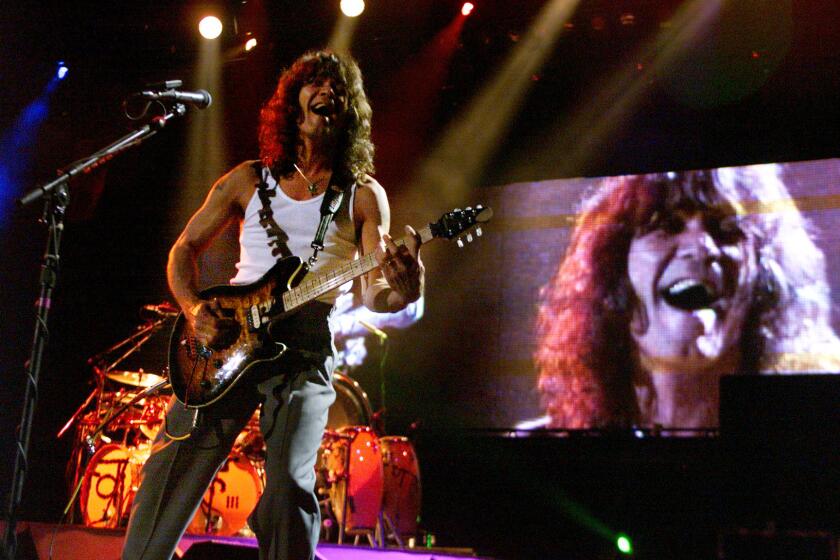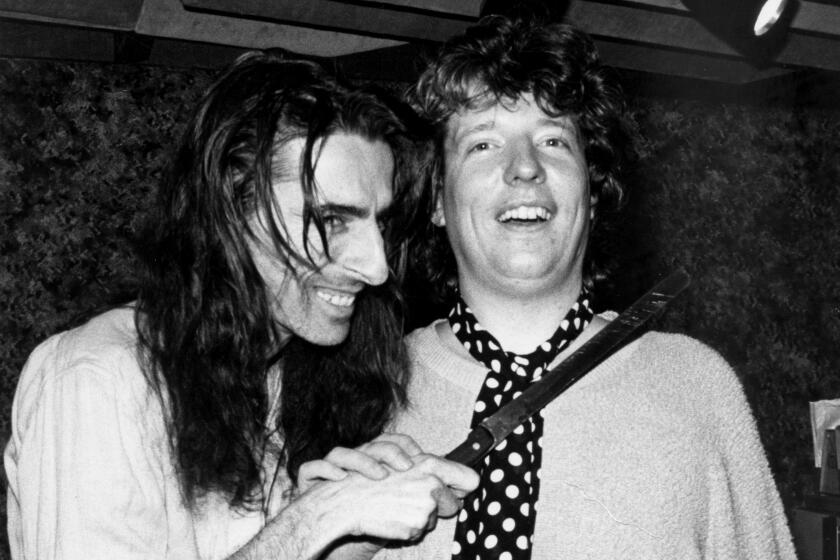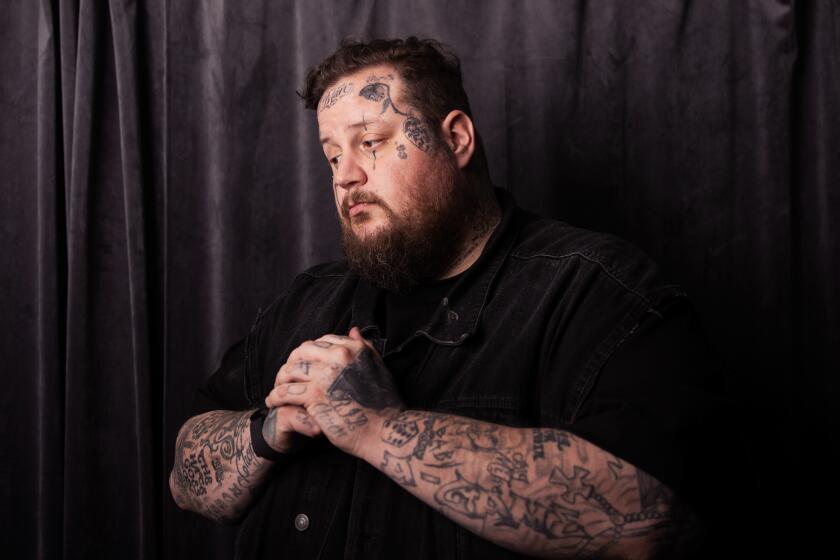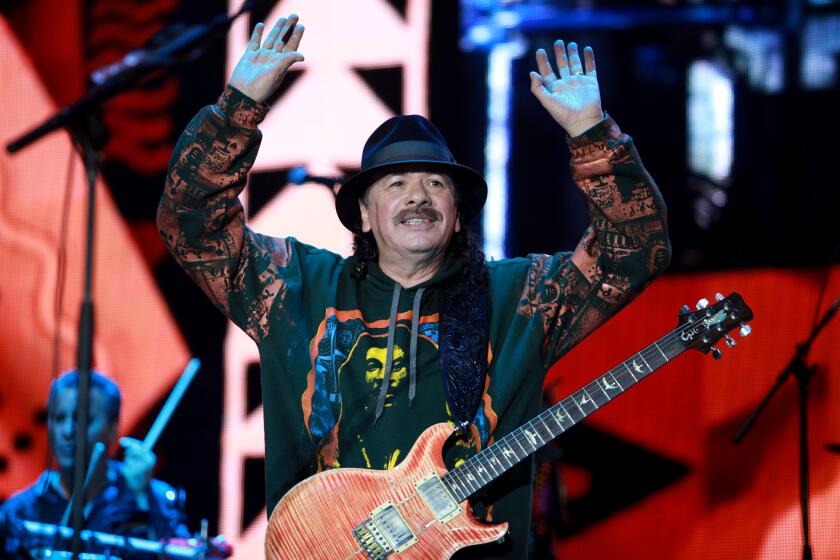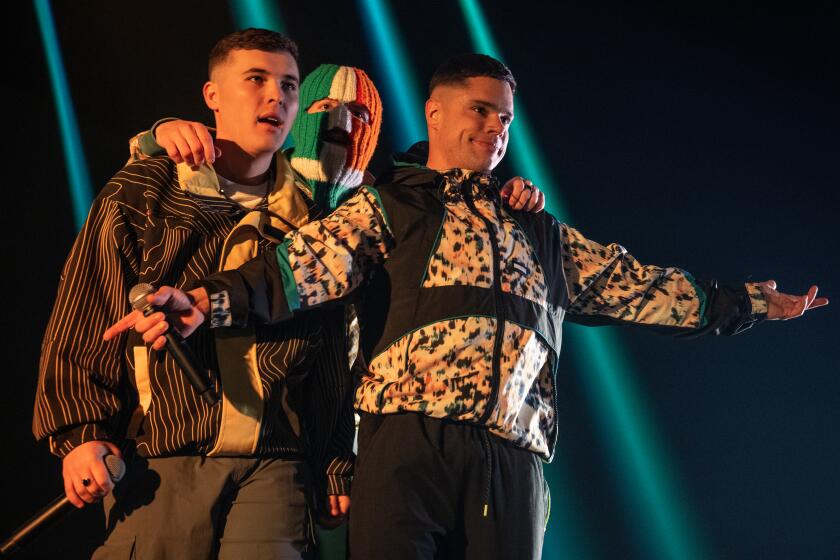Sammy Hagar on his most lucrative hit and why he didn’t ruin Van Halen

- Share via
Sammy Hagar has been one of rock music’s most visible personalities for over half a century — from his days fronting Montrose in the early 1970s through his stint as Van Halen’s singer in the mid-1980s and early ’90s to his perch in recent decades atop the Cabo Wabo booze-and-bars empire.
Yet these days, Hagar says, “I seem to get along better with guys in the country world than with most rock stars.” Kenny Chesney, Ronnie Dunn, the late Toby Keith — Hagar counts each as not only a dear friend but also a kindred spirit. “Country music is about songs and stories, and it’s about honesty,” he says. “That’s what I’m about too.”
Consider that overlap one reason Hagar, 77, is high on the bill for this weekend’s Stagecoach festival in Indio, where he’ll perform alongside some of Nashville’s biggest stars, including Luke Combs, Jelly Roll, Brothers Osborne and Ashley McBryde. (Consider also that the festival has some other non-country acts in Creed, T-Pain and the Backstreet Boys.) From Stagecoach, the California native will head to Las Vegas with his current road band — guitarist Joe Satriani, drummer Kenny Aronoff and former Van Halen bassist Michael Anthony — to launch a residency at the Park MGM casino.
Guitar virtuoso Eddie Van Halen died Tuesday at 65. Here are 20 career-defining performances.
Ahead of the gigs, Hagar got on Zoom from his home in Mill Valley the other afternoon to tell the stories behind five of his signature hits — and one poignant new song that looks back at his relationship with Eddie Van Halen, who died in 2020.
Montrose, “Rock Candy” (1973)

Named after founding guitarist Ronnie Montrose (who’d played earlier with Van Morrison and Edgar Winter), Hagar’s first successful band went platinum with its self-titled debut, which featured this funky hard rock jam.
Ted Templeman, who’d signed us, came to rehearsal the day before we were going in the studio. We didn’t have any money, so we thought we were just gonna go in and play the songs almost live, then get out on the road, which was our dream. Ted goes, “If only we had one more song … You guys got any ideas?” Denny Carmassi plays that drum beat, and Ronnie starts playing the riff. I’m sitting there listening — that’s the reason the intro’s so long, because I was just waiting — and finally I start singing, “You’re rock candy, baby — hard, sweet and sticky.”
I just made it up on the spot. The magic came right from my heart and soul. Sounds so stupid — like, my heart and soul is about those little sticks with a bunch of sugar on it? But those were my favorite when I was a kid. If I got one of those suckers in my Christmas stocking or trick-or-treating, I was like, “All right!”
“Pull up your pants / Stretch out — take a chance.”
You know what I was thinking about with those lines? It wasn’t intentionally sexual.
There’s no way that’s true.
I’m telling you: I was talking about how you have to pull up your pants to take a long step — almost like rolling up your sleeves to get something done.
You’ve got to be the only guy in rock ‘n’ roll history who wrote a song where you’re talking about hardness and stickiness and it’s not about sex.
It is now [laughs]. The Def Leppard guys, they love that song — they use the “hot sticky sweet” thing in “Pour Some Sugar on Me.” They notified me immediately: “We’re ripping you off, mother—.”
“Rock Candy” is a very slow song by Montrose’s standards.
We never even used to play it live because it was so slow. Now I’ve played it in probably 90% of the sets I’ve done since then. I always play it because that drum thing is so iconic. Denny was a big John Bonham freak, and that’s just pure Bonham right there. But a lot of guys can’t play that sparse and hold a groove back that long like Denny did.
Templeman or anybody try to get you to speed it up?
No, Ted got us to pull it back — he wanted that Zeppelin “When the Levee Breaks” kind of thing. We recorded it at Sunset Sound in a room that used to be a meat locker — all cement and steel. Ted said, “Let’s cut the drums in there,” but Denny couldn’t hit the cymbals. He had to just play kick and snare and toms because if you hit the cymbals they’d reverberate for 20 minutes.
Sammy Hagar, “I Can’t Drive 55” (1984)

After leaving Montrose in 1975, Hagar launched a solo career that eventually yielded this staple of MTV’s early years, in which the longtime car enthusiast rails against a nationally mandated speed limit.
It’s a legitimate protest song — I was pissed. The story is that at the end of the “Three Lock Box” tour, I took my family on a wonderful vacation to Egypt, Africa, Sardinia, all these gorgeous places. Spent more money than I’d ever planned on spending in my life. Coming back, we went from Kenya to London, which is a long flight, then we got on the Concorde.
Ooh la la.
This was 1983, baby — I was really splurging. So we fly to New York, get off that plane, take another puddle-jumper to Albany to take my son Aaron back to boarding school in Lake Placid, which is another two- or three-hour drive. I’ve been traveling for 24 hours, it’s 2 o’clock in the morning, I’ve got a young boy asking, “Are we there yet?” — I was cooked. Got pulled over going 62 miles an hour, not a soul on the highway. And the cop wasn’t cool: “You know how fast you were going?” I said, “Yeah, I was going 62 miles an hour.” He said, “We give tickets for 62 miles an hour around here.” I had no idea they changed the speed limit. I look at my wife and I go, “I can’t drive 55.” Then I went, “Holy s—.”
You heard the words leave your mouth.
Subconscious things just coming out of me — it’s a weird gift I have. Back in those days, I always had a little cassette recorder with me, and I started singing the song into it. I’m telling my wife to write the lyrics down while the guy’s writing me a ticket. By the time he’s done, I’m telling him, “Thank you!” The song really changed my career — changed my life. Financially, it’s earned me more money than any song I’ve ever written or been involved with, including Van Halen.
Why do you think it resonated in such a big way?
All the truckers, cab drivers, limo drivers, bus drivers — anybody that drove for a living, which a lot of people on this planet do — it was their song. It made every compilation that had anything to do with NASCAR or any kind of drag race. But also it was real — I really mean what I’m singing.
Ahead of a show with Journey at SoFi Stadium, the Def Leppard frontman talks about why his band has stuck together.
The punk band Minutemen titled 1984’s “Double Nickels on the Dime” in response to “I Can’t Drive 55.”
Were they dogging me?
Good-naturedly dogging you, I’d say.
How could you dog Sammy Hagar with any kind of animosity? It’s impossible. What’s the band that did “Sammy Hagar Weekend”?
Thelonious Monster.
I think they did it in jest too. If they didn’t, they know better now.
Van Halen, “Why Can’t This Be Love” (1986)

David Lee Roth quit Van Halen in 1985, leaving a spot for Hagar, who came recommended, as the story goes, by his and Eddie’s shared mechanic. (The band was rounded out by Eddie’s brother Alex on drums.) Van Halen’s first LP with its new singer, “5150,” became the band’s first to top Billboard’s album chart, though some old fans balked at the record’s synth-heavy sound.
Everyone talks about me ruining Van Halen — the Roth fans or the people that just will not let go of that era — but I had nothing to do with nothing. I wrote the songs with Eddie, but they were his musical ideas to begin with. He’d reinvented the guitar neck and was kind of burnt out on it — couldn’t do much more with the thing. He really wanted to play a lot of keyboards, but he was used to getting s— from Roth and Al about it.
I remember he started playing “Love Walks In,” and I’m going, “This is a beautiful piece of music. Why the f— have you not used this?” He said, “Man, I’ve been sitting on this for like three years.” Dave just didn’t sing like that — he probably couldn’t bring something like that home. Eddie had all these other keyboard songs: “Why Can’t This Be Love,” “Feels So Good,” “When It’s Love.” We stretched them out because I’m like, “Man, we can’t put all these on one record — we’ll lose our audience.”
With that in mind, you had to have recognized that “Why Can’t This Be Love” was a risky choice for the first Van Hagar single.
Part of it was intentional, to take the band in a new direction. We didn’t want the first thing people heard to be the opening track on that album, with the “Hellooooo, baby” — that could have been David Lee Roth doing that. We wanted to reinvent ourselves.
What’d the record label say?
Mo Ostin, the president of Warner Bros. Records, came in and we played him the song. He got the biggest grin on his face, sticks his finger in the air and goes, “I smell money.” That’s why it was the first thing to come out. The crazy thing is, our manager Ed Leffler wouldn’t let us make a video for the song because of the same thing — because Roth was such a video-oriented guy. We said, “You want to see this band, you’re gonna have to buy a ticket.”
“Why Can’t This Be Love” peaked at No. 3 on the Hot 100. Do you remember what was at No. 1 that week?
What was it?
Whitney Houston, “Greatest Love of All.”
How could you complain about that? My God, she was one of the greatest singers who ever walked this earth. I was gonna guess somebody like Hall & Oates or something more pop. You know, Van Halen wasn’t a pop band, really, but really we were. And that was before me — I mean, “Jump” was a pop monster. Eddie could write good pop music, and with a voice like mine, I can sing anything. It was pretty easy to have a pop hit in that band. We didn’t try at all.
Van Halen, “Right Now” (1991)

One of five Top 10 rock singles from Van Halen’s “For Unlawful Carnal Knowledge” — check the acronym — “Right Now” set an aspirational lyric about seizing the day against another of Eddie’s keyboard arrangements.
I’d been reading a little Zen stuff about the here and now — about how important it is to be in that space, which is impossible unless you’re going to meditate in a f— cave somewhere. Then one morning I’m laying on the beach in Malibu before going to the studio. Eddie yells down, “Yo, mother—, it’s time to go.” I said, “Man, I just want to stay right here, right now.” I heard myself say it, just like “I Can’t Drive 55.” I’m like: Hmm, interesting. Then I started writing it.
You say in your 2011 memoir that it took you months to get anyone in the band to check out what you wrote.
Before me, Eddie and Alex didn’t give a s— about lyrics. They didn’t know what the lyrics were. Eddie told me that him and Al, they didn’t even have Dave in their monitors — they just listened to the two of them. So when I’d go in there with this lyrical content, Ed wasn’t saying, “Oh, I don’t like that” — he’d just brush it off. But [Eddie’s ex-wife] Valerie [Bertinelli] was interested in my lyrics, and that got Eddie’s attention.
“For Unlawful Carnal Knowledge” came out just as grunge was about to explode. I wondered how cognizant you were that rock music was changing around Van Halen.
It made me nervous. We took Alice in Chains out with us on that tour because — well, first of all, I thought “Man in the Box” was one of the coolest rock songs ever. But I also wanted to embrace grunge. I’m going, “Hey, let’s take these guys out and introduce ourselves to their audience and then introduce them to our audience.” They got booed off the stage almost every night. Layne [Staley] would take off his jacket and squat down at the front of the stage and go [holds up middle fingers] while he was singing.
But the point is that I thought “Right Now” was a great way to grow up. Singing “Hot for Teacher” now, at 77 years old — I’m sorry, it’s embarrassing. I wanted to sing lyrics that I could sing for the rest of my life. I have plenty of those other kinds of songs. “Rock Candy,” it’s borderline, but at least I’m not making it about some 14-year-old. It could be about my beautiful 58-year-old wife.
The hitmaking producer also worked with the Cars, Cheap Trick, Ozzy Osbourne and Alice Cooper.
The “Right Now” video is a classic of the era: a bunch of random clips overlaid with slogans about oil companies and unprotected sex.
I’m like, “I just wrote the best lyrics I’ve ever written, and you want to cover them up with some other s—? F— you!” But Warner Bros. was adamant about it — here’s old Mo Ostin again.
It won video of the year at the MTV Video Music Awards.
And I had that shoved up my ass for about two years every time I tried to argue about something: “Yeah, yeah — just like you didn’t want to do the ‘Right Now’ video.”
“For Unlawful Carnal Knowledge” also won a Grammy — Van Halen’s only one — for best hard rock performance. You beat Guns N’ Roses’ “Use Your Illusion I.”
Wow. To me that was their best record.
Did winning a Grammy mean something to you?
Every award or validation is so important to me — I’m proud of those babies. But that Grammy was big. I’d been up for the “Footloose” soundtrack [in 1985]. I remember standing there with Kenny Loggins over on the side of the stage, and f— Prince walks out and gets it for “Purple Rain.”
Sammy Hagar and the Waboritas, “Mas Tequila” (1999)

Van Halen fired Hagar in 1996, after which the singer returned to making music under his own name and focused on his bars — including a flagship cantina in Cabo San Lucas, Mexico — and a tequila brand he’d later sell for $80 million.
When I’m around the house, unless I have to leave, I do not put on long pants. I brought the shorts and the T-shirts into Van Halen. They were all glittered up before that, then I walk in with my flip-flops and tank tops. A lot of people didn’t like it, but too bad. I went lifestyle with the music — with the Wabos — after [1997’s] “Marching to Mars.” I moved to Cabo, lived in a bathing suit, walked onstage with no shirt back in those days.
What happened with “Mas Tequila” is that there’s a guy named Narada Michael Walden — great songwriter and producer, worked with Whitney and a bunch of other people — he said, “Let’s make a record.” He told me the trend was that people were sampling their favorite songs and writing a new song around it. I knew that was happening, but I didn’t think I was gonna do it — that was rappers and stuff. But I said, “My favorite record is ‘Rock and Roll Part 2,’ the Gary Glitter song.” He goes, “Write a song around it.” It wrote itself.
The groove is just so infectious. Gary Glitter got a co-writing credit on it. That wasn’t my idea — I thought I changed everything just enough. But the record company said, “No, no — we’re not gonna release it unless you make a deal with him.” I’m sure he’s very happy about it. The Black Keys stole that groove too [for 2010’s “Howlin’ for You”]. I don’t think they paid for it. They should be paying me.
Sammy Hagar, “Encore, Thank You, Goodnight” (2025)
Hagar rejoined Van Halen for a tour in 2004 that the singer says was marred by Eddie’s drinking. (Roth stepped back in as frontman three years later.) Eddie died of cancer at age 65 amid tentative plans to perform with Hagar once again. Hagar’s latest single, which he co-wrote with Satriani, is due for release Friday.
It’s a thank-you to Eddie Van Halen — it’s saying, “Since you’ve been gone, it’s not the same,” because it isn’t. For the music, I thought: How can I make this an homage to Eddie? I had a dream, and I remembered some of the music from the dream. But I can’t play guitar that way. So I sent Joe these videos of me singing this little chorus and told him how the riff goes. And Joe, man, he just channeled Eddie. We’d just come off a big tour where he’d been playing 14 Van Halen songs every night, so he knew Eddie’s s— inside and out.
It was in his fingers.
It was in his soul. He’s playing his own s—, but it’s very Eddie-esque. I miss the guy so much. Thank God we connected towards the end, otherwise I’d be heartbroken. I am anyway. But it was so important to me that we did connect in that last year. Eddie said to me, “Don’t tell anyone about us talking because I don’t want to be answering questions about rumors of a reunion.” But he said, “Next year, we’re gonna get together — we’re gonna make some noise. Let me beat this s—, and let’s do it.” He goes, “Please don’t talk to anyone — not even Al.” I’ve never said that to anyone, and I bet you Al is gonna have a f— fit. But Eddie said, “Don’t even talk to Al about this.” I said, “Ed, I don’t talk to Al.”
When you say it hasn’t been the same since Eddie died, is that because there’s no chance now that you guys will play together again?
Things aren’t the same without that hope. After the 2004 tour, with Eddie being in the condition he was in, I was very angry with him. But in my heart I was hoping he would heal and would become the Eddie that I loved and knew from when I was in the band — from the good times. I was hoping that would happen and that we’d get together and play someday. And not only for the fame and fortune, which of course I’ve never gotten back to that level since. That was the pinnacle of my career.
But more than that was the creativity and the energy we had together writing songs like “Right Now” and “When It’s Love” and “Love Walks In” and “Top of the World.” He brought something out of me that just ain’t the same without him. At my age, you sit there and wonder: If Eddie was alive, could I reach that again? Now that dream is gone.
More to Read
The biggest entertainment stories
Get our big stories about Hollywood, film, television, music, arts, culture and more right in your inbox as soon as they publish.
You may occasionally receive promotional content from the Los Angeles Times.
